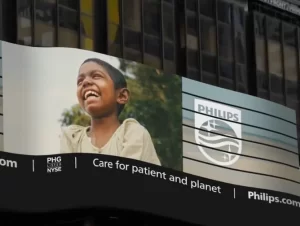
Leading healthcare technology company Philips is helping two billion people lead better lives while also meeting impressive ESG goals for the planet
Recognised as one of the leading healthcare technology companies when it comes to environmental, social, and governance (ESG) performance, Philips is already meeting and beating some of its own ambitious targets.
Royal Philips, to give the Dutch company its full title, has worked with key partners to increase access to sustainable healthcare, increased its circular revenues, and reduced its operational and value chain carbon emissions.
Most impressive perhaps is the fact that Philips improved the health and wellbeing of 1.88 billion people, 221 million of those in underserved communities, taking the company close to its goal of improving 2 billion lives per year by 2025.
“Building on our strong heritage in environmental and social responsibility, we have a fully integrated approach to doing business responsibly and sustainably, in line with our company purpose,” said Marnix van Ginneken, Executive Vice President and Chief ESG & Legal Officer.
“I am convinced that our ESG commitments are the best way for Philips to drive priorities for global impact and create long-term value for our stakeholders.”
Philips is in the top three health technology companies in the global 2023 Dow Jones Sustainability Index, and Carbon Disclosure Project (CDP) also gives the company an ‘A’ List ranking for the 11th consecutive year.
Philips has been carbon neutral in its operations since 2020 and has set ambitious targets for 2025 to further mitigate climate change.
Philips Focused on Science-Based Targets

When it comes to diversity and inclusion, Philips reached 31% of women in senior management in 2023 – being named in Forbes Best Employers for Women and Forbes Best Employers for Diversity.
2023 was also a strong year for Philips on the renewables front, with the company exceeding its 75% science-based target for renewable energy usage – Philips hit 78% ahead of its 2025 goal.
This builds on the 2022 success of Philips being the first health technology company to be approved by the Science-Based Targets initiative (SBTi) for its CO2 emissions reduction targets, covering Scope 1 to 3. Philips intends to make 50% of purchases with suppliers who have also committed to science-based targets by 2025, and has already reached 46%.
Millions of people around the world still have limited access to basic healthcare, and that situation is being exacerbated by climate change. That’s why Philips is doing all it can to provide technology solutions to serve the most in need.
Working with partners, Philips is leveraging AI to empower midwives to provide ultrasound scans in remote, rural communities in Kenya.
In Australia and North America, Philips is using mobile CT trucks to serve underserved communities with access to life-saving lung screening.
Philips is also looking at ways it can decarbonise healthcare and provide more sustainable solutions. Examples include MRI scanners that are more energy efficient, or reducing the carbon footprint associated with radiology.
Philips has launched a new global brand campaign ‘Care means the world’ that recognises its responsibility for the health and wellbeing of both people and planet.
As the company says, “if we want to continue to care for patients in the best way possible, we need to take care of our planet with the same attention and urgency, now and in the long term”.
It is reassuring to see that even when it comes to essential healthcare, sustainability remains a priority.
